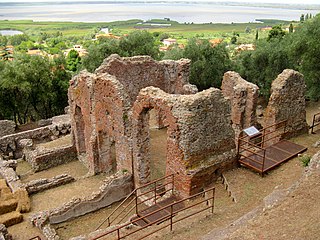Related Research Articles
AD 65 (LXV) was a common year starting on Tuesday of the Julian calendar. At the time, it was known as the Year of the Consulship of Nerva and Vestinus. The denomination AD 65 for this year has been used since the early medieval period, when the Anno Domini calendar era became the prevalent method in Europe for naming years.
Lucius Aemilius Paullus was the son of Paullus Aemilius Lepidus and Cornelia, the elder daughter of Scribonia. He was married to Julia the Younger, the eldest granddaughter of the Emperor Augustus.
Gnaeus Cornelius Lentulus Gaetulicus was a Roman senator and general. He was ordinary consul in the year 26 with Gaius Calvisius Sabinus as his colleague. Gaetulicus was involved in a plot against the emperor Caligula, and following its discovery he was executed.
Gaius Salvius Liberalis Nonius Bassus was a Roman senator and general, who held civil office in Britain and was a member of the Arval Brethren. He was suffect consul in the last nundinium of 85, with Cornelius Orestes as his colleague.
Lucius Vipstanus Poplicola Messalla was a Roman Senator.
Lucius Vipstanus Gallus was a Roman senator who is the first documented member of the gens Vipstana. His descendants and relatives include several consuls.
Claudia Marcella Minor (PIR2 C 1103, born some time before 39 BC) was a niece of the first Roman emperor Augustus. She was the second surviving daughter of the emperor's sister Octavia the Younger and her first husband Gaius Claudius Marcellus. Marcella had many children by several husbands, and through her son Marcus Valerius Messalla Barbatus she became the grandmother of the empress Messalina.
Lucius Caninius Gallus was a Roman senator who was appointed suffect consul in 2 BC.
Gaius Antius Aulus Julius Quadratus was a Roman senator from Pergamon, who was appointed consul twice, in AD 94 and then in AD 105, the first senator from the Eastern Mediterranean to achieve the ordinary consulship.
Marcus Aponius Saturninus was a Senator of Imperial Rome, active in the latter half of the first century AD. His parents, also of senatorial rank, were wealthy and owned property in Egypt. He appears in the Acta Arvalia in the year 57 AD; classicist Ronald Syme suggests that he was made a member of the Arval Brethren due to the influence of Annaeus Seneca. Saturninus is mentioned as being present in 66 for sacrifices on the Capitol with the emperor Nero. Tacitus calls him a consul, but the date of his office is uncertain. He may have been consul in 55; Classical scholar Paul Gallivan at the University of Tasmania has argued that Saturninus was suffect consul between 63 and 66, by which time he was recorded as becoming promagister.
Tiberius Julius Candidus Marius Celsus was a Roman senator who lived during the Flavian dynasty. Contemporary sources, such as the Fasti Ostienses, the Acta Arvalia and a letter of Pliny the Younger, refer to him as Tiberius Julius Candidus. He was twice consul.
Titus Junius Montanus was a Roman of the first century and suffect consul in AD 81 with Lucius Julius Vettius Paullus as his colleague. An inscription found in Alexandria Troas indicates that was his hometown, making Montanus the first person from the Greek portion of the Roman Empire admitted to the Roman senate.
Lucius Venuleius Montanus Apronianus was a Roman senator of the first century. He was suffect consul for the nundinium of January to April AD 92 with Qunintus Volusius Saturninus, replacing the emperor Domitian.
Gaius Catellius Celer was a Roman senator who flourished during the Flavian dynasty. He served as suffect consul for the nundinium September-October 77 with Marcus Arruntius Aquila as his colleague.

Lucius Venuleius Apronianus Octavius Priscus was a Roman senator of the second century. He was ordinary consul as the colleague of Quintus Articuleius Paetinus in 123. Subsequent to his consulate, Priscus was proconsular governor of Asia in 138 and 139. He is known primarily through inscriptions.
Gaius Julius Silanus was a Roman senator and general who held a series of offices in the emperor's service. He was suffect consul for the nundinium of January to April 92 as the colleague of Quintus Junius Arulenus Rusticus. Silanus is known solely through inscriptions.
Lucius Cornelius Sulla Felix was a Roman senator of the first century AD. He was a consul ordinarius in AD 33 as the colleague of Galba, the future emperor. Felix was the son of Sulla Felix, a member of the Arval Brethren who died in AD 21, thus a direct descendant of the dictator Sulla. His mother was Sextia and his older brother was Faustus Cornelius Sulla.
Gaius Vibius Postumus was a Roman senator, who flourished under the reign of Augustus. He was suffect consul for the latter half of AD 5 with Gaius Ateius Capito as his colleague. Ronald Syme identifies him as a novus homo from Lavinum in Apulia. His brother Aulus Vibius Habitus was suffect consul in the latter half of AD 8.

The gens Venuleia was a patrician family of ancient Rome and of Pisa originally, which flourished from the 1st to the end of the 2nd century AD.
Marcus Vipstanus Gallus was a Roman senator at the beginning of the first century AD. He served as suffect consul in 18 with Gaius Rubellius Blandus as his colleague.
References
- ↑ Paul A. Gallivan, "Some Comments on the Fasti for the Reign of Nero", Classical Quarterly , 24 (1974), p. 291, 310
- ↑ Tacitus, Histories , I.76
- ↑ Syme, The Augustan Aristocracy (Oxford: Clarendon Press: 1986), p. 242
- ↑ Syme, Some Arval Brethren (Oxford: Clarendon Press, 1980), p. 16